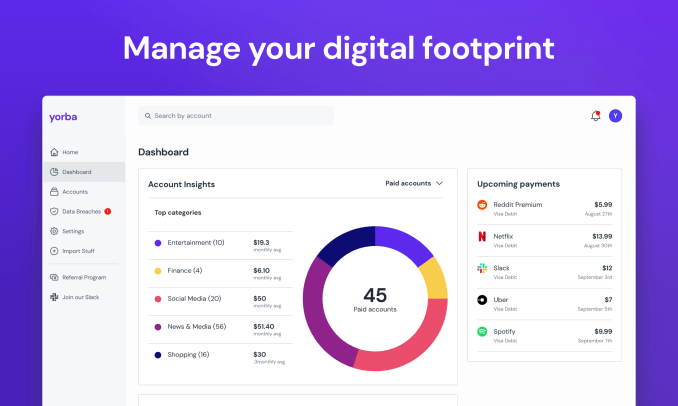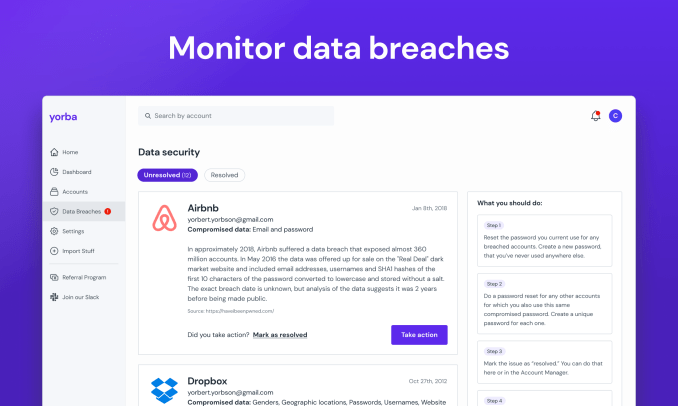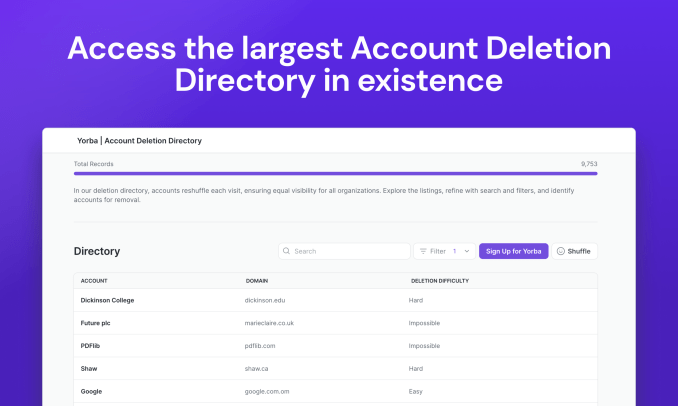Spend enough time online, and you’ll collect a digital paper trail of accounts, logins, subscriptions, mailing lists, and passwords wrapped up in data breaches. A new startup called Yorba can help you get a better handle on your ever-expanding digital footprint with the launch of its multi-purpose tool for decluttering your online life. From its web-based dashboard, you can organize, monitor, and manage your online accounts, unsubscribe from mailing lists, cancel subscriptions, review privacy policies, and more.
The end result is something like a Mint for your entire online life, so to speak.
The analogy to the older personal finance tracker is apt because, like Mint, Yorba doesn’t hold any of your data on its own. Instead, it works by connecting with your online accounts, like your Gmail, and soon other online services and cloud storage providers. Yorba scans your email using natural language processing and machine learning techniques to discover your digital “relationships” — that is, the accounts you have, services you subscribe to, and mailing lists you’re on. You can also connect to financial institutions via Plaid integration, and import accounts via CSV.

From your Yorba dashboard, you can view stats about how you interact with your various accounts, and make decisions about what action to take — like resetting a password that was found in a data breach, canceling accounts because of their weak privacy policy, unsubscribing from a mailing list that spams you, and more.
Explains co-founder and CEO Chris Zeunstrom, “Our goal right now is to aggregate all these things and give insights, and then be able to slowly build in tools that have direct action from Yorba.”

Image Credits: Yorba
Zeunstrom says he was inspired to work on the project after finding it hard to focus because of getting overloaded by emails across multiple accounts.
“These emails are all basically vulnerability points that could be breached,” he notes. Zeunstrom had started using a password manager to try to get his accounts under control, but found that didn’t solve the problem.
“[Password managers] are good at aggregating the bloat, but they don’t help you reduce it,” he tells us. “We need something that’s almost like a Fitbit for digital relationships. We see Yorba as a relationship manager and trying to build better relationships between people and on the platforms that they use,” Zeunstrom adds.
Some of the functionality Yorba offers may not be unique.
There are already tools to get off mailing lists, like Unroll.Me or even Gmail’s built-in unsubscribe functionality. Services like Rocket Money (formerly Truebill) can you manage and cancel subscriptions. But what makes Yorba different is that it’s putting all these functions and more under one roof.

Image Credits: Yorba
In addition to its mailing list and subscription management, Yorba can also warn you about accounts associated with data breaches, a feature password managers also offer, and can help you discover old accounts you no longer use, view stats on things like how often an account emails you and how often you actually open those emails.
It can even analyze a company’s privacy policy and offer a grade, based on how invasive or unethical it is. (The latter is provided in partnership with an Amsterdam-based nonprofit, “Terms of Service; Didn’t Read.” The organization is working to implement machine learning to read and grade privacy policies, which are then checked by a human reviewer at the end.)
Yorba was originally started three years ago as more of a research project, before incorporating as a public benefit corporation and launching its private beta last year.

Image Credits: Yorba
What makes Yorba appealing, beyond its functionality, is its ease of use. This is due to the fact that the team includes those with a UI/UX background, as the project has initially been funded by Zeunstrom’s design firm, Ruca. Instead of raising venture funding, Yorba is funded through Ruca’s “give-back model.” Essentially, that means when Ruca signs a contract with a client, a portion of that revenue goes into a fund that’s distributed to other companies.
Zeunstrom has since stepped away from New York-based Ruca to run Yorba full-time from Lisbon, he says.
Yorba’s team also includes co-founder and CTO David Schmudde and CDO Nolan Cabeje. Zeunstrom had originally connected with Schmudde when trying to recruit him for an earlier political tech startup, Advocate.io. Though Schmudde declined that job, his interest in data privacy led him to join Yorba several years later. Cabeje, meanwhile, hails from Ruca.
The company plans to expand its reach with new services and features in the months to come. It’s looking at integrations with other services, like Dropbox, Google Drive, Proton Drive, and others. Plus, it’s partnered with Tim Berners Lee’s Solid, so anyone could bring their own data to Yorba in time — but without Yorba storing the data itself, only acting as an organizing layer.

Later this spring, Yorba will also launch a feature tied to Data Rights Protocol’s efforts to standardize consumers’ data rights requests, like account deletions. This new feature will be similar to Just Delete Me’s service, which guides consumers on how to delete their accounts at around 1,500 sites and services. Yorba, however, will support 10,000 sites in its account deletion directly.
Further down the road, the company aims to add features that would allow you to update your mailing address with companies when you move as well as your credit card information when you get a new card.
Since launching into public beta last month, Yorba has over 1,000 users, 160 of whom are premium subscribers. The Premium plan is $6 per month, billed annually, and offers active data breach monitoring, subscription management, and an unlimited number of actions for managing your online accounts.
“It’s basically priced to just make it so we can make enough money to self-sustain, so we don’t need investors,” says Zeunstrom.
Yorba is free to use for basic functionality like account scanning, however.
techcrunch.com




